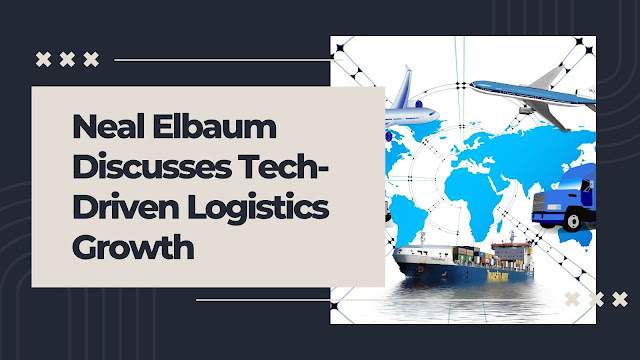Neal Elbaum Discusses Tech-Driven Logistics Growth
In an era where technology is redefining every industry, logistics stands out as one of the most rapidly evolving sectors. At the heart of this transformation is Neal Elbaum, a seasoned shipping and logistics professional with a track record of optimizing international supply chains. With years of hands-on experience and a forward-thinking approach, Elbaum has emerged as a key voice in the conversation around tech-driven logistics.
Embracing the Digital Supply Chain
Neal Elbaum emphasizes that the shift from traditional to digital supply chains is no longer a trend — it’s a necessity. The integration of technologies like Artificial Intelligence (AI), the Internet of Things (IoT), and blockchain has significantly improved visibility, speed, and decision-making in global shipping.
“Digitization helps companies anticipate disruptions, allocate resources efficiently, and offer real-time tracking,” says Elbaum. “This kind of agility wasn't possible a decade ago.”
According to him, modern logistics companies must adopt these innovations not just to stay competitive, but to meet rising customer expectations around transparency and speed.
Artificial Intelligence: Predictive Power in Logistics
One of the most impactful technologies in logistics today is AI. Elbaum explains how AI algorithms are used to forecast demand, optimize routes, and minimize delays. Predictive analytics allow companies to make informed decisions, saving both time and money.
“AI helps us move from reactive to proactive logistics,” he notes. “It’s like having a control tower that sees the future and guides your fleet accordingly.”
Elbaum highlights the growing use of AI in warehouse automation as well — from robotics that manage inventory to systems that streamline last-mile delivery.
Blockchain: Securing Global Trade
In international shipping, trust and accuracy are everything. This is where Elbaum believes blockchain can play a major role. He points out that the technology offers tamper-proof records, which improve accountability across all parties involved in a transaction.
"With blockchain, every step of the shipment — from factory to port to doorstep — is traceable. It reduces disputes, paperwork, and fraud," Elbaum explains.
He also notes that smart contracts enabled by blockchain are streamlining customs and payment procedures, cutting down on processing time and errors.
IoT: Real-Time Visibility Like Never Before
Another game-changer in logistics is the Internet of Things (IoT). Elbaum discusses how sensors placed on containers, trucks, and warehouses provide real-time data on location, temperature, and handling conditions.
“This real-time visibility ensures sensitive cargo like pharmaceuticals or perishables are transported safely. It allows companies to take immediate action if something goes wrong,” he says.
IoT also enhances fleet management by providing insights into vehicle health, driver behavior, and fuel consumption.
Customer-Centric Innovation
For Elbaum, the ultimate goal of tech integration is better customer service. He explains that today’s clients expect updates at every stage — from order placement to final delivery. Technology not only meets this expectation but also enables personalized service.
“Whether it’s a retail customer tracking a package or a manufacturer managing inventory, tech makes the experience seamless,” Elbaum says.
He also adds that automation and digital tools are reducing errors and speeding up delivery times, which directly impacts customer satisfaction.
The Road Ahead
Despite the benefits, Elbaum acknowledges that not all logistics firms are keeping pace. Legacy systems, high implementation costs, and resistance to change are major roadblocks. However, he remains optimistic.
“Those who invest now in tech infrastructure will be the leaders of tomorrow. Logistics is no longer about moving goods — it’s about moving information, fast and accurately.”
Elbaum encourages companies to start small, integrate scalable tools, and build a culture of innovation. He believes partnerships with tech providers and startups can also accelerate progress.
Conclusion
Neal Elbaum’s insights underscore the critical role of technology in the future of logistics. By embracing AI, IoT, blockchain, and other innovations, companies can unlock new levels of efficiency, accuracy, and customer satisfaction. As global trade continues to grow in complexity, leaders like Elbaum are showing the path forward — where tech-driven logistics is not just an advantage, but the new standard.



Comments
Post a Comment